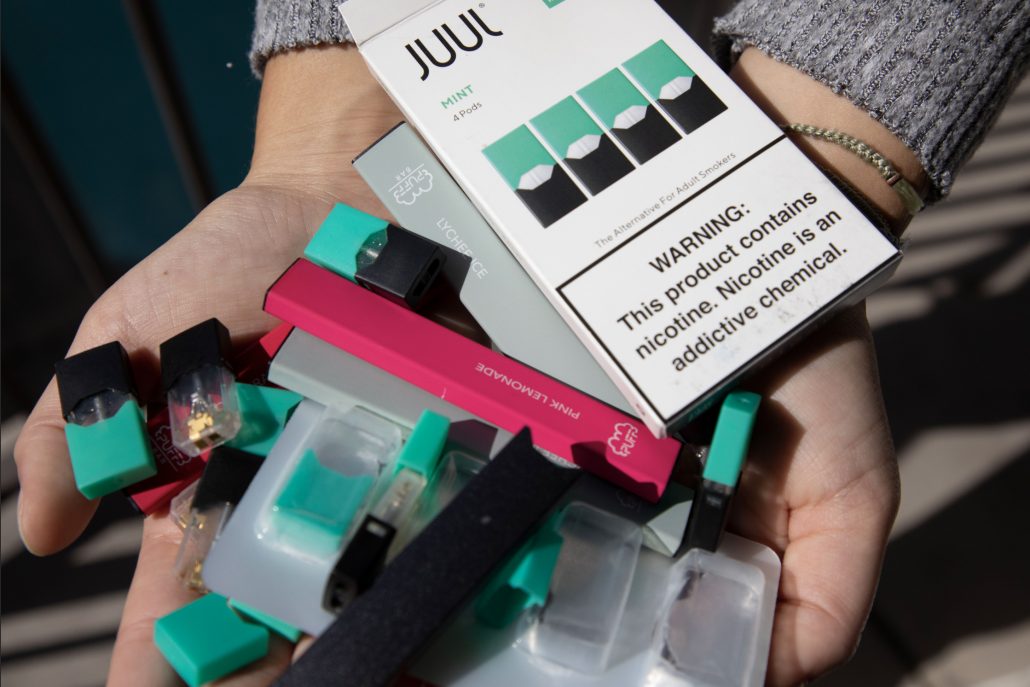California takes tougher stance on e-cigarettes popular on campus

During her freshman year, Aadi Ghildiyal remembers sitting on a kitchen floor in Cale and Irani Residential College watching her friends pass around a STIIIZY, a common THC vape pen, while they all hung out. Each time Ghildiyal was handed the pen, she declined to try it and passed it along to her other friends.
Ghildiyal, now a sophomore majoring in chemistry, said she never wanted to vape and wasn’t surprised when Los Angeles County health officials recently urged residents to stop vaping after the Centers for Disease Control and Prevention reported potential health concerns.
“I was never really interested in vaping anyway, and I never really understood the people who did it, but it wasn’t really my place to tell them to stop,” Ghildiyal said.
Marijuana wax pens, Juuls and Suorins have become staples at college parties and social events over the last few years. USC is no exception. Even though students aren’t technically allowed to vape on campus under the no-smoking rule, Connor Fausto, a senior majoring in business administration, says he sees the impact that vaping has on his peers and those around him.
“It is slightly social because you’re surrounded by it so much, but then there’s a certain point where people use it to deal with stress, and that just has to do with being at a place where you’re expected to succeed,” Fausto said.
The CDC stated that, as of Oct. 1, more than 1,000 cases of lung illnesses and 18 deaths have occurred in at least 48 states, all likely connected to using e-cigarettes and similar vape products. The majority of cases involve young adult men between the ages of 18 and 35 who use THC delivery vapes. Little else is known about what causes the severe symptoms patients experience, like vomiting, chest pain, shortness of breath and persistent coughing.
The Mayo Clinic published a study Oct. 2 that examined 17 patients’ lung tissues. The report found that toxic chemicals in vape products could be causing damage to patients’ lungs.
Rob Kuznia, an adjunct professor at the Annenberg School for Communication and Journalism, recently visited downtown L.A.’s “Cannabis District,” where many black-market vape products are made and distributed, and reported what he learned for the Washington Post.
“One of the most telling or surprising or maybe even alarming things about that area was how much it dominated the block,” Kuznia said. “There was shop after shop after shop, and … a lot of the shops had ‘do not enter’ signs, and they were chained off. You had to be a member to go in.”
Kuznia also mentioned that he saw shops selling empty vape cartridges and counterfeit packaging in bulk. As a result of the ever-increasing number of vape-related illnesses, many states have proposed bills that would ban the sale and distribution of all flavored nicotine vape products. Michigan passed its first piece of legislation, with Gov. Gretchen Whitmer citing a public health emergency as her reasoning behind the sudden change in regulations.
California politicians have followed suit. L.A. County officials voted Oct. 1 to temporarily ban sales of flavored tobacco products, which is set to take effect at the end of the month. Since then, the vote has been met with protests from many Angelenos who argue that it’s their right to vape despite potential risks.
CJ Mack, a sophomore majoring in music industry, opposes the bans in favor of those who have turned to vape as a way to quit smoking cigarettes. Juul, a popular e-cigarette brand, markets its product as a cleaner, less foul-smelling alternative to smoking cigarettes. Additionally, their flavored nicotine pods are much more attractive to new smokers than traditional cigarettes.
“I think that it’ll just turn people back to cigarettes if they don’t have the right support system in place to essentially stop [using] nicotine in general, because I don’t think this is a question of vaping versus not vaping,” Mack said. “I think this is a question of how to get people to stop [using] nicotine.”
As for Ghildiyal, she doesn’t think the vape hype is going to fizzle out anytime soon, even in light of the incriminating evidence against vape culture.
“It’s like almost every other person is a part of vape nation or whatever… it’s like Venmo or Lyft or something. Everyone does it,” Ghildiyal said.

